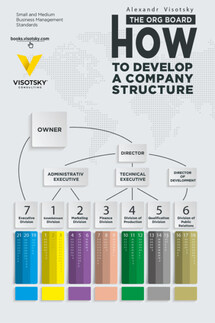A Job Description for the Business Owner - страница 15
Think big. Don't waste your time on pseudogoals like “making more money,” “benefiting everybody,” or even “becoming number one in the industry.” Assess what the company can realistically achieve in the long run. If you manufacture furniture, maybe your goal would be “providing comfort and design for people’s lives.” If you are a grocery wholesaler, perhaps it would be “creating high-quality living standards for a wide range of people by providing a fresh and premium-quality range of grocery items.” Of course, these goals need to reflect your own aspirations and talents. One owner will start a company to bring the latest technology to the market. Another owner will start a company to provide satisfying and cheerful service. Ever since he started walking, my nephew, Vasiliy, has amazed the people around him with one particular habit: He cannot walk past an excavator, truck, crane, or tractor without stopping to admire it. The boy can just stand there and admire such machines, enjoying them. As you can imagine, his mother does not share his fascination, and every time he stops to gaze, she tries to pull him away. What kind of company will he start when he grows up? I don’t know, but I do know one thing for sure: If he does become an owner of company that a produces construction machinery, he will be doing what he likes most. What goals will he establish for the company? Perhaps they will be “to provide construction workers with reliable and efficient machinery and contribute to the prosperity of the construction industry.” Companies’ goals are really very distinct, as individual as their owners.
Trying to set up a goal based on the individual goals of the group members is also a common mistake made by business owners. The owner needs to be aware that as the founder as well as a member of the group, he performs a very specific function: He forms the goal for the entire group. An example of this kind of mistake would be to say, “Our company’s goal is to provide customers with a quality product, increase owners’ equity, and create a decent standard of living for our employees.” This is not a goal. It is merely an attempt to please everyone who has something to do with the company—employees, owners, and customers. And this attempt to please is the exact opposite of the manifestation of individuality. A problem with such goal formation is that people are not so naïve as to believe that this is really the group’s goal.
I am genuinely surprised by what results when some not very clever consultants’ brainstorm about the main goal and purpose of a company with its top management team. They come up with these monstrous ideas that do not inspire anyone—not managers, owners, or employees. Have some fun by reading the goals and mission statements of some of these various companies online.
Occasionally, I help owners to create mission statements for their companies. I first ask them questions that relate to the purpose of the company. I ask what the initial business idea was and whether it had any competitive advantage that distinguished the company from its competitors. I ask the owner to describe the company’s operations in a few words. When the purpose is clear, I help him or her state the main goal by asking questions about what would change in the company’s external environment if it successfully carried out its purpose. Why do I start with the purpose? I do this because the purpose is more concrete to people, as it will determine the company’s course of action. The main goal, however, is less apparent, though in essence it is predetermined by the purpose.









